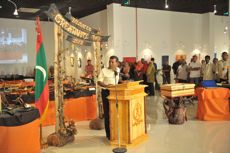Two years after registration the Friendship Association of India-Maldives (FAIM) launched its website last night in honor of India’s Republic Day, pledging new opportunities for cross-cultural dialogue between the two nations.
Maldives President Mohamed Nasheed said the country would “continue to get aspirations and lessons from the Indian experience.”
In conjunction with the cultural classes and services available through the Indian Cultural Center (ICC), FAIM aims “to strengthen the relationship, create friendships and build mutual understanding between the peoples of India and Maldives through organizing social, cultural, academic and other activities of mutual interest.”
Highlighting India’s artistic traditions, FAIM staff expressed a strong interest in supporting arts in the Maldives.
“The Maldives has very little internal support for the arts,” said a FAIM secretary. “We would really like to see what we can provide,” he said, acknowledging that the Maldivian community has a lot of hidden talent.
India and the Maldives enjoy close partnerships in education, technology and transportation development; India recently passed a regulation allowing Maldivians visa-free entry for 30 days.
In addition to encouraging cultural exchange, FAIM encourages a greater understanding of the distinct cultures. “Although archaeological finds indicate that the Maldives was inhabited as early as 1500 BC, much of the country’s origin is lost in history – most of which is as much folklore and myth as fact,” states the FAIM website.
While welcoming guests for “a light evening”, Indian High Commissioner and FAIM patron Dynaneshwar Mulay addressed the ongoing political turbulence and judicial crisis in the Maldives by affirming the close ties shared between the two nations.
“A democracy will see upheavals,” he said. “The Maldives is perhaps one of India’s closest partners. The Indian High Commission will always be there to help the Maldives.”
Mulay recollected that the Indian public protested against corruption last year, upholding rights embedded in its 1950 constitution. The protests, triggered by Anna Hazare’s Ghanid-esque hunger strike in April, captured world audiences and was voted one of Time Magazine’s Top Ten Stories of 2011.
Affirming the importance of India’s warm relationship with the Maldives, President Mohamed Nasheed said consolidation of democracy, including establishing a rule of law and an independent judiciary, is “our biggest and most important project.”
Thanking the Indian “people, its government and its institutions for the very necessary and good assistance they continue to give to the Maldives in our work to become a democratic society,” the President assured those gathered that the government shares concerns raised about the nation’s judicial crisis but views them as part and parcel of the task at hand.
“We have heard many criticisms, and we will continue to hear them. Would the end justify the means?” he queried.
“What I am sure of is that the people of this country aspire for a free and fair judiciary. And they want the judiciary to look like them. They wanted the presidency to look like them. They wanted the Parliament to look like them. And therefore the new judiciary has to look like them. They have to look like the Maldives. That is what has been asked of me, and that is what I am going to do.”
“Very often we have to invent, and invent out of the box,” the President said, asking for other powers to understand the Maldives’ current situation as a necessary, if complex, path to a stronger democracy.
Emphasising the value of cross-cultural dialogue in diplomatic matters, the President expressed hope that the traditional Indian thabla music would “broaden our minds and give us means to understand what is happening around us.”
